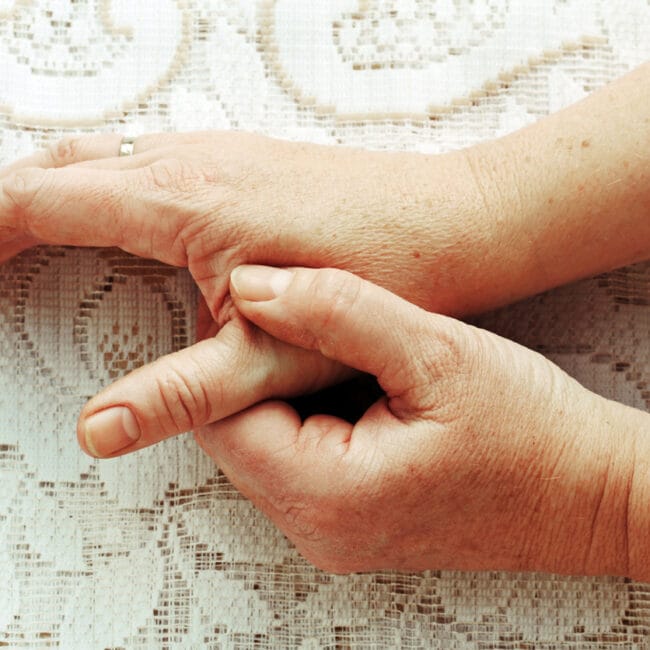Paraesthesia, or “pins and needles” as it is more colloquially known, refers to a feeling of discomfort associated with itching, tingling or “skin crawling”. Generally pins and needles is a benign and transient experience. However, there are situations where the experience of pins and needles may be indicative of a more sinister pathology and will require further medical investigation.
Pins and needles can be caused by a variety of different factors, and they occur as a result of decreased conduction of signals back to the central nervous system (i.e. spinal cord and brain).
Most commonly, pins and needles occur after an individual sits or lies in a certain position for too long, which is putting pressure on nerves or vascular structures. For example, if you sit on your foot or sleep on your hand, it is completely normal to experience a feeling of pins and needles. Once you relieve the pressure on the nerves or vascular structures, the pins and needles tend to quickly resolve.
Typically, the experience of pins and needles is painless and transient. However, it is important to have awareness of whether or not you may require further medical investigation.
If you are experiencing pins and needles more regularly in your day-to-day life which are not associated with staying in one position for too long, then it is possible something else may be going on.
When should I seek urgent medical attention?
Seek urgent medical attention if you experience pins and needles, burning and/or weakness in one or both arms and have any of the following red flag symptoms:
Difficulty speaking
Difficulty breathing
Dizziness
Drop attacks
Double vision
Nausea/eye flickering/numbness
Tremors
Or if you experience pins and needles, burning and/or weakness in one or both legs and have any of the following red flag symptoms:
Bowel/bladder dysfunction: e.g. inability to go, incontinence, inability to stop and start when urinating
Saddle numbness
Alterations in gait (walking)
Unexplained weight-loss
Night sweats or night pain
Previous infection or generally unwell
If you experience pins and needles or numbness in your neck and/or jaw, you should also seek medical attention.
Common conditions that require further assessment, but may not be medical emergencies:
Examples of some relatively common medical conditions which may result in pins and needles, as well as other symptoms, include the following:
Carpal tunnel syndrome – This refers to pain due to compression of the median nerve as it passes through your wrist to supply the skin and some muscles in your hand. This condition is typically associated with pain. It is very common in office jobs, hairdressers/barbers and carpenters (to name but a few).
Spinal nerve root compression – This can occur for a variety of reasons. The most common is probably a disc bulge/protrusion. This may result in referred pain into a leg (if the disc issue is in your lower back) or an arm (if the disc issue is in your neck). This may be associated with a ‘burning’ or ‘stabbing’ pain into a limb and/or associated weakness.
Spinal nerves may also be compressed due to stenosis (i.e. narrowing of the space for the spinal nerve), which tends to be due to degenerative changes. If your only symptom is pins and needles it is unlikely to be a medical emergency. However, if you have any other associated symptoms, you should make it a priority to get assessed.
When there is compression of or irritation to the sciatic nerve this is commonly referred to as sciatica. If you have previously been diagnosed with sciatica, you can click here to try and get some relief.
Peripheral neuropathy – symptoms of this include a gradual onset of pins and needles and/or numbness, sensitivity to touch and a sharp burning/throbbing pain in your hands and/or feet. Causes for this condition can be numerous. Some risk factors for the development of peripheral neuropathy include:
Over the age of 55
Diabetes
Obesity
High blood pressure
High cholesterol
Heavy alcohol usage
If you have symptoms of peripheral neuropathy, it is important to go to your GP as soon as possible as symptoms may progress.
The above are just a few of the more common causes of pins and needles, but there are many more.
It is important that if you do have ongoing pins and needles or if you have any other associated symptoms to get assessed by a medical professional.
Key take home messages:
Pins and needles are usually just a benign and transient experience. If it is something you experience occasionally and have no other symptoms, it is unlikely to be a cause for concern.
There are many medical conditions where pins and needles are one of numerous symptoms. Most of these can be treated well through early diagnosis, medication and/or physiotherapy. If you have any additional symptoms, make an appointment with your GP or physiotherapist to be assessed.
In rare cases, pins and needles (with associated symptoms) may be indicative of something more sinister. If you have pins and needles combined with any of the red flag symptoms above, it is important you seek urgent medical attention.










